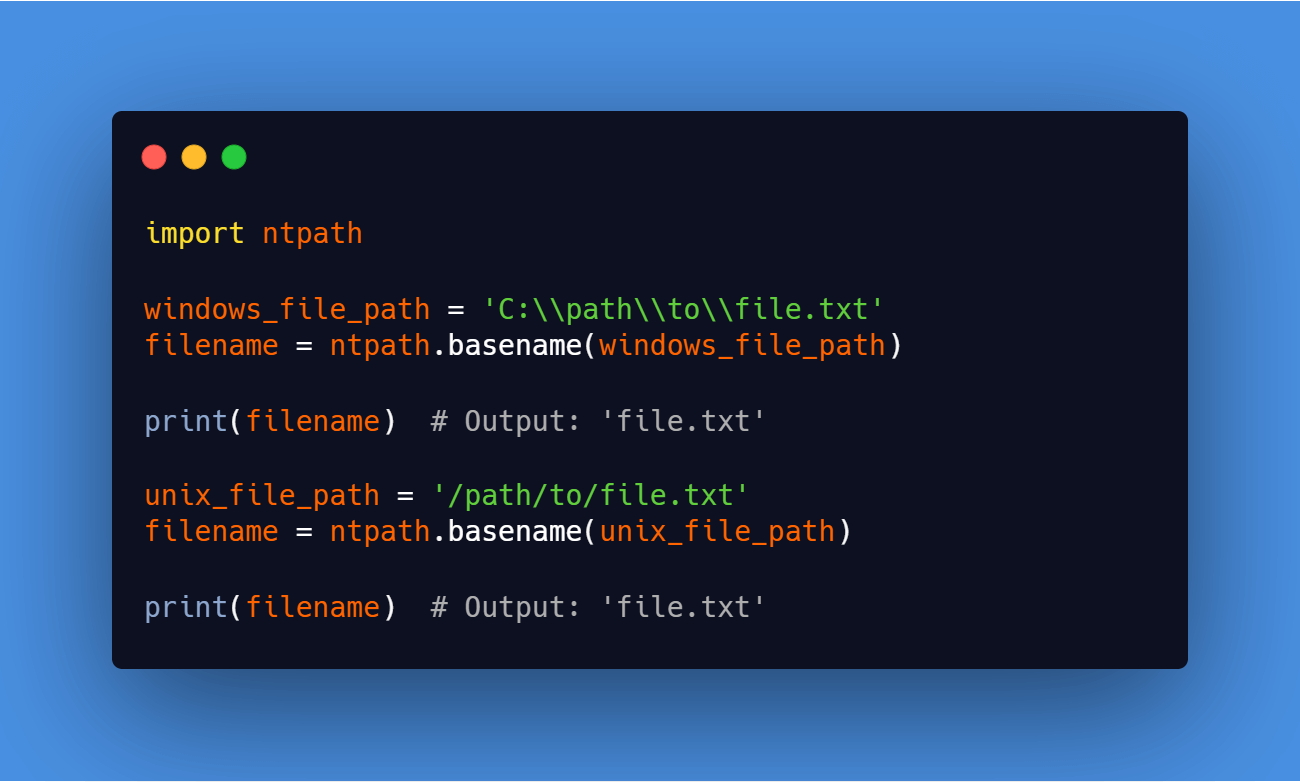In Python, there are several built-in modules for manipulating file paths, including the os module and the ntpath module.
Both of these modules provide functions for extracting the filename from a file path, but the ntpath module is specifically designed to work properly on all operating systems for all types of file paths.
The ntpath.basename Function
The ntpath.basename function is the most reliable and straightforward way to extract the filename from a file path on all systems. It takes a file path as an argument and returns the base name of the file path, which is the file name and extension.
Here is an example of how to use ntpath.basename:
import ntpath
file_path = 'C:\\path\\to\\file.txt'
filename = ntpath.basename(file_path)
print(filename) # Output: 'file.txt'
file_path = '/path/to/file.txt'
filename = ntpath.basename(file_path)
print(filename) # Output: 'file.txt'Code language: Python (python)One of the benefits of using ntpath.basename is that it handles all the complexities of Windows-style file paths, including handling different directory separators (/ and \\). The output above will be consistent regardless if it is run on Windows, Linux, or Mac.
Other Options
While ntpath.basename is the best option for extracting the filename from a file path, there are other options available.
The os.path.basename Function
The os module also provides a basename function, which can be used to extract the filename from a file path on any system.
However, it is not as reliable as ntpath.basename because when run from Linux it won’t properly parse Windows-style paths, and when run on Windows it won’t properly parse Unix-style paths.
Here is an example of how to use os.path.basename:
import os
file_path = '/path/to/file.txt'
filename = os.path.basename(file_path)
print(filename) # Output: 'file.txt' when run on Linux
file_path = '/path/to/file.txt'
filename = os.path.basename(file_path)
print(filename) # Output: '/path/to/file.txt' when run on Windows
file_path = 'C:\\path\\to\\file.txt'
filename = os.path.basename(file_path)
print(filename) # Output: 'C:\\path\\to\\file.txt' when run on Linux
file_path = 'C:\\path\\to\\file.txt'
filename = os.path.basename(file_path)
print(filename) # Output: 'file.txt' when run on Windows
Code language: PHP (php)As you can see from the examples above, os.path.basename doesn’t work properly on systems when they are working with file paths from other operating systems.
String Manipulation
If you want to extract the filename from a file path using string manipulation, you can use the split method to split the file path by the directory separator (/ on Unix-like systems and \\ on Windows). Then, you can take the last element of the resulting list to get the filename.
Here is an example of how to do this:
file_path = '/path/to/file.txt'
parts = file_path.split('/')
filename = parts[-1]
print(filename) # Output: 'file.txt'
Code language: PHP (php)
Leave a Reply